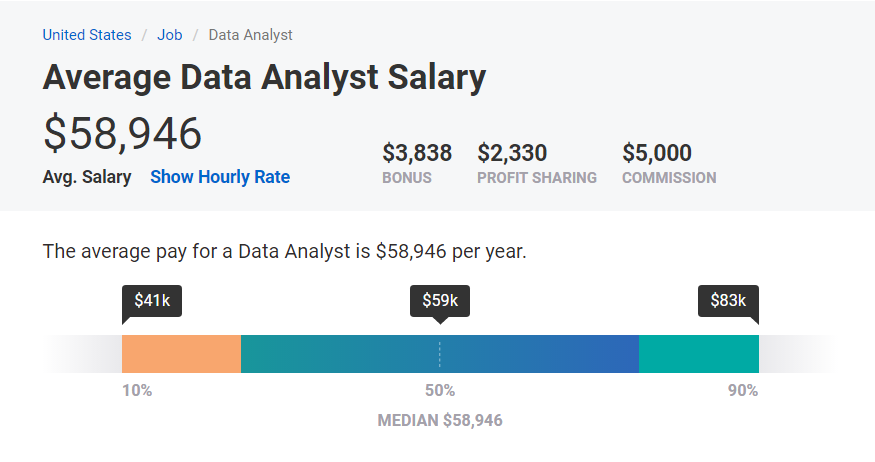How to Become a Data Analyst

Data analyst is a relatively new position available at several companies. It’s also a high-salary specialization without a complex learning curve. Thus, many professionals are looking to make a career switch to this burgeoning field. In this article, I’ll explain what skills you need to become a junior data analyst. We’ll also review some tips for making this career change and see what an entry-level data analyst salary looks like.
Data Analyst Skills
I’ve been working as a data analyst at a big corporation for the past three years. In my professional opinion, in order to become a data analyst, you don’t need an intimate understanding of any specific area. Rather, I believe what you need is the correct combination of two essential skills: data knowledge and business knowledge.
Data Knowledge
The first thing you need is previous experience working with data. A basic understanding of SQL is good for starters, but experience with other software that manipulate data can compensate for a lack of SQL knowledge. Examples of positions that don’t require SQL skills include MS Excel data analyst or spreadsheet data analyst. However, both usually have lower salary levels.
Business Knowledge
Second, you need a good understanding of the business where you’ll be working as a data analyst. Why? Because a data analyst’s main task is to extract valuable insights from a company’s database that can hopefully be used to:
- Predict business trends.
- Discover customer behaviors.
- Forecast previously unknown information.
As a data analyst, you can work in several areas of a company. The areas with the greatest demand for data analysts include finance, marketing, insurance, professional services, and information technology.
Of course, as in every profession, you can go deeper and learn other concepts, topics, or tools to apply as a data analyst. These include statistics and related software/languages (e.g., R), artificial intelligence, and machine learning.
Still, learning SQL is a good place to start if you’re a complete beginner who wants to become a data analyst. Fortunately, learning SQL is really easy—and there are tons of online resources to help you on your journey.
Where to Look for Data Analyst Jobs
My first advice is to explore openings at your current company before considering a new one, especially if you have no data analysis experience. That’s because it’s easier to get approved for a relocation inside your current company than to get a job offer from another one. On the plus side, as a current employee, you already have the knowledge of the business that every data analyst needs.
If you work for a company where a data analyst position is available, you can try to apply for it. However, don’t just do this blindly. First, try to identify the following:
- What main metrics are used to measure the results of the company?
- What are the metrics to predict or forecast the future performance of the company?
- How are all of these metrics calculated?
- Is there any database from which these metrics can be extracted or calculated?
If you have the proper permissions, you can try to write an SQL query to calculate any of these metrics. If you succeed, you can show it to the company managers or directors. They’ll be happy to see your query, and you’ll be closer to securing that data analyst position.
Many medium-sized companies don’t have a data analyst position yet. If this is your case, perhaps you can evangelize the importance of data-oriented business by stressing the importance of good decision-making.
For example, perhaps you can mention a business mistake made in the past and demonstrate how this mistake could’ve been prevented awith data analysis. The stronger your argument, the better your odds of convincing your company to open up a data analyst position—managers and directors love people who offer ideas to maximize revenue.
Be Ready for the Interview
Nobody can anticipate the questions that will be asked on your interview. But I do know what a recruiter is looking for in a junior data analyst candidate.
Remember that recruiters don’t just look for technical skills like SQL. Besides, recruiters themselves may lack the knowledge to assess those technical skills. In an interview for a junior data analyst position, a recruiter will likely try to get a good sense for your personality:
- Are you you detail oriented?
- Do you have analytical thinking skills?
- Are you good with math and numbers or basic statistics?
- Do you have some experience with SQL or other related tools for data management?
Remember that a recruiter looking for a junior data analyst can’t expect you to have extensive experience. Rather, they’re more likely looking for a candidate with high potential to develop and grow to eventually become an experienced data analyst. Of course, if you claim to have SQL experience or certain technical skills, you must show it. Any question related to SQL should be answered with authority or examples.
Another important thing to consider is your communication skills. As a data analyst, you’ll need to be able to communicate your hypotheses, ideas, and findings to laymen. Demonstrate these skills as appropriate during the interview.
Data Analyst Salary Range
Data analysis is a lucrative field. There are hundreds of articles published online that suggest that data analysis will be one of the quickest growing job areas in the next few years. Many universities also offer a master’s in data science with this future in mind. There are also several reports that show data analysis to have a salary above the U.S. median, and overall higher job satisfaction ratings.
For example, according to a 2019 PayScale report, the yearly salary for data analysts in the United States, based on experience, ranges from $41,000 to $83,000 per year:

The lower salaries (around $41,000 a year) are for junior data analyst or data analyst with no experience, while higher salaries (around $83,000) are for senior-level data analysts.
As you can see, the data analyst median salary is a few thousand above the US median salary (which was $56,000 according to the latest Census data); thus, it's certainly worth pursuing a career in data analysis!
Closing Words
Data analysis is a growing and in-demand field. In fact, Forbes magazine published an article predicting that the number of data analytics jobs will grow by nearly 364,000 listings to approximately 2,720,000 by 2020.
I mentioned that practicing your SQL skills is a good place to start if you want to become a data analyst, and I stand by that—it’s a commonly used tool on the job!
If you’re looking for some good resources, be sure to check out Vertabelo Academy’s beginner-level SQL courses.
And remember: Everyone has to start somewhere. Your first steps, however little, will get you that much closer to the beginning of a promising career!







